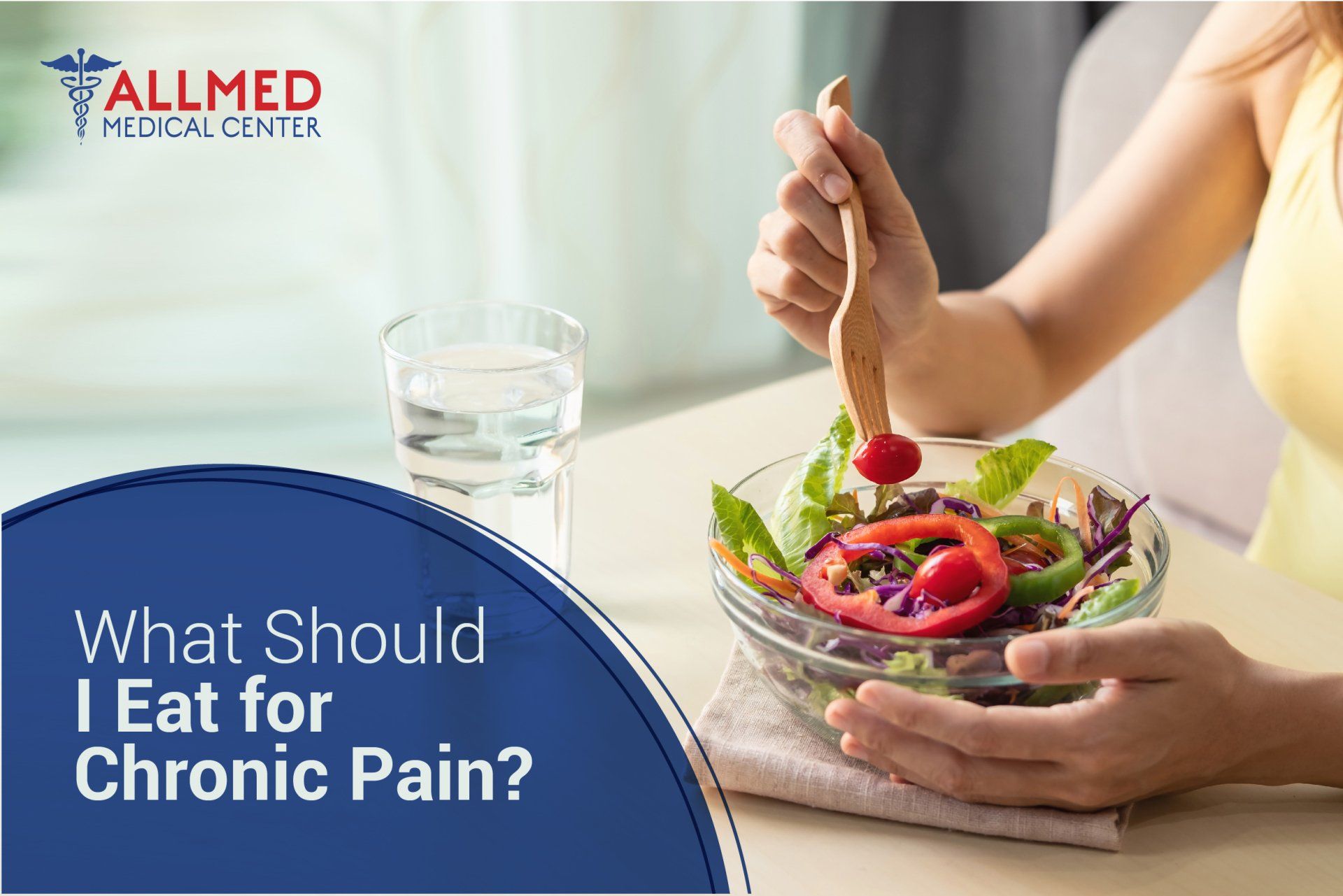What Should I Eat for Chronic Pain?

If you're like many people who suffer from chronic pain, you've probably spent a lot of time and effort looking for answers to reduce your pain. Although the causes of chronic pain are different from one person to the next, your diet is one thing that you can tweak to help relieve a lot of your pain without having to spend thousands on expensive treatments.
In this article, AllMed Medical Center provides a list of foods you should eat more of and foods you should avoid to help relieve inflammation and chronic pain.
An Overview of Chronic Pain and Inflammation
Your immune system becomes activated when it detects something foreign such as pollen, bacteria, or chemicals. As a result, inflammation often occurs. It's the way your body protects itself from illness, injury, and infection. There may be symptoms such as discomfort, heat, redness, and swelling in the body, which causes pain.
In other cases, inflammation develops into a chronic condition, adversely affecting the body. It damages cells and organs of the body, resulting in recurring pain in the muscles, joints, and tissues. Besides inflammation, chronic pain may also result from obesity, chronic disease, age, and poor lifestyle habits.
Inflammation and chronic pain negatively impact the lives of those who suffer from it. It can make even the simplest tasks seem impossible and so challenging to accomplish. But chronic pain doesn't have to be something you are resigned to dealing with for life. There are many things you can do to cope with it better, which will be discussed next.
What to Eat and What to Avoid When Suffering from Chronic Pain
Making smart lifestyle choices is one of the most important aspects of chronic pain management. Apart from getting regular exercise and sleeping well, a nutritious diet significantly impacts chronic pain. What you eat can help or impede your efforts to manage your pain.
List of Foods to Eat
Too many people rely on medications to manage their pain and take painkillers for prolonged periods of time. But many people don't realize that you can eat certain foods to reduce pain, some of which are listed below.
Fruits and Vegetables
Make fruits and vegetables a major part of your diet, and you'll be in a better position to live pain-free. Opt for dark-colored fruits like red grapes, cherries, berries, and pomegranates since they prevent inflammation particularly well. For vegetables, go for the green ones to reduce oxidative cell stress in the body. Eat cabbage, spinach, broccoli, brussels sprouts, green beans, and cucumbers. If you suffer from arthritis pain, avoid nightshades such as potatoes, tomatoes, and eggplants.
Whole Grains
Whole grains such as oats, barley, buckwheat, wheat, brown rice, quinoa, spelt, and rye, are good options to avoid inflammation. Complex carbohydrates in whole grains provide the body with energy for longer periods of time and are not immediately converted into sugar. These are a healthier alternative to white flour and processed grains.
Lean Proteins
Salmon, which is rich in omega-3 fatty acids, is a good anti-inflammatory choice for protein. Other fish you should consume are tuna, herring, anchovies, sardines, and mackerel. However, you must avoid tilapia and catfish, which contain omega-6 fatty acids that may contribute to inflammation. Apart from fish, you can also consume turkey, chicken, and egg as your source of protein. You can also get protein from lentils, beans, nuts, flaxseeds, and peas, which contain a lot of antioxidants.
Spices and Herbs
Aside from adding flavor to dishes, spices and herbs contain antioxidants that may help reduce inflammation, especially when it comes to arthritis pain. These include turmeric, ginger, thyme, mint, bay leaves, cinnamon, cayenne, oregano, cloves, black pepper, and rosemary.
Healthy Oils
Whenever possible, use olive or avocado oil in place of butter or other oils. Extra-virgin olive oil facilitates joint movement and protects cartilage from degeneration. Avocados and avocado oil are rich in vitamin K, which has been shown to reduce arthritis pain.
Water
Aside from food, consuming a lot of water can also help decrease pain. Dehydration can make the body more sensitive to pain. In addition to poor wound healing and constipation, it can also undermine health, especially for the elderly. Water plays a significant part in the circulation of nutrients as well as waste removal, factors that contribute to healing and pain relief. You can also drink green tea at least once a day.
List of Foods to Avoid
The following is a list of foods and drinks to avoid if you want to reduce chronic pain or are currently managing or recovering from chronic pain.
Foods High in Sugar
Sugar is probably the most important for chronic pain patients as it is one of the leading causes of inflammation and pain. It triggers sensitivity to pain, speeds up aging, and increases inflammation by a large margin. If you want to have something sweet, opt for the fruits instead. You can also discuss which sugar-free alternatives are suitable for you with our healthcare experts.
Highly-Processed Foods
Sodium, preservatives, and other artificial ingredients in these foods are damaging to the body. It increases oxidation and inflammation, aggravating pain in the body. Adding highly-processed foods to your diet can also elevate your risk of chronic diseases such as diabetes and cardiovascular disease.
Refined Carbohydrates
Refined carbohydrates such as white rice, white bread, cereals, and pasta, have gluten which causes inflammation for people who can't digest it. In addition to gluten, refined carbs have virtually no nutritional value and are converted into sugar in the body immediately. Chronic pain sufferers should avoid sugar or not consume it all as it triggers inflammation.
Processed Meat and Red Meat
Consuming meats that have been processed, such as deli meats, ham, hot dogs, sausages, and bacon, will not work well for pain management. Additionally, it may also help to limit the consumption of red meat, such as beef.
Milk and Dairy
For people who cannot process casein and lactose properly, milk and dairy consumption can cause stomach upset, bloating, and digestive pain.
Saturated Fats & Other Oils
Some certain oils and fats cause inflammation in the body, including butter, shortening, lard, soy, corn, safflower, and sunflower oils. Avoid them or only use a small amount when cooking or making dressings. Choose healthier options, as mentioned previously.
Caffeine
Essentially, a high caffeine intake decreases the threshold for pain and causes the nervous system to become more sensitive to pain. The effects of excessive caffeine can also disrupt our patients' sleep patterns, which is vital for managing tension, stress, and pain. Because of this, it's best to limit your daily intake of coffee and energy drinks.
Relieve Chronic Pain Effectively!
Help is available for people suffering from chronic pain. At AllMed Medical Center, our priority is to help our patients achieve a quality of life free from pain. Our expert physicians are dedicated to providing the best possible care for you.
Get in touch with us today! Contact 1-833-255-6332 or schedule an appointment online.
AllMed Medical CentersServing
Greater Sacramento
Allmed Medical Center | All Rights Reserved.









